One year to Rio 2016: Five global athletes' Olympic odysseys
- Published
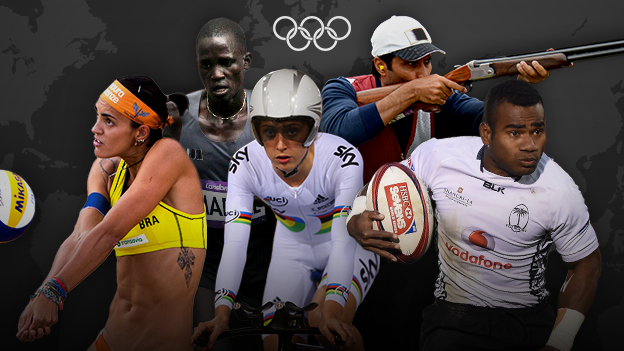
Fernanda, Maker, Trott, Al-Attiyah and Tuwai are all hopeful of reaching Rio
One year out from the start of the Olympic Games in Rio, five athletes - one from each of the continents symbolised by the Olympic rings - give an intimate insight into their lives and their hopes for next summer.
From the South Sudanese refugee who had vowed never to run again after fleeing civil war to the British cyclist vying to make history, the athletes share their Olympic journeys in their own words.
The refugee runner
Marathon runner Guor Mading Maker, 31, will represent the world's newest country, South Sudan, in its first Olympic Games. He returned to his birthplace in 2013 and was reunited with his parents, two decades after making a tortuous escape from the civil war which claimed the lives of two million people.
When I left Sudan, I said "I will never run again" because I thought running was only for me to save my life.
I was seven when my parents sent me to live with my uncle in northern Sudan. It was the best decision they made. If I had stayed I would probably have lost my life like my [eight] siblings.
It took me three years to be able to get to him [Guor was forced into labour by Sudanese soldiers and also kidnapped by herdsmen]. Life there was not easy, so thinking back to it is something I always try to avoid.
Me and my uncle had to flee to Cairo in Egypt when I was 15. We received refugee status and were sent to Concord in New Hampshire.
It was only in 2013 that I went back to see my parents. It was overwhelmingly emotional. I walked over to their house and my mum almost walked past me because she didn't know who I was.
Someone shouted and that's when she saw me and collapsed out of shock. Her whole body was shaking. I was feeling the same too; I froze for a minute. All of a sudden I realised my mum was on the ground and so I knelt down, hugged her and lifted her up. She kept tapping me and saying "is it you, is it you?"
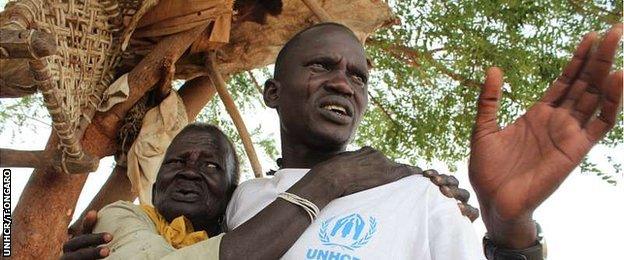
Guor Mading Maker's mother, Athieng Majak Kon, clings to him following their reunion in 2013
My gym teacher in the United States talked me into running. At first, I told him it was not my thing. But it felt different, I was running for pride.
It was in my junior year in high school I realised that I was good. When I started Iowa State University, me and my room-mate stuck a note on the wall saying our goal is 2012 - going to the Olympics.
My first marathon was in October 2011 and I ran the Olympic qualifying time. But I was not going to be able to go to the Olympic Games because I was neither a South Sudanese nor US citizen at the time.
I was a man without a country.
If I ran for Sudan, I would be betraying my people. I would be dishonouring the two million people who died for our freedom. The IOC looked at my case and said "yes, he's a refugee, so he's going to run under the Olympic flag".
I came 47th in London* - it didn't turn out how I wanted but it was a good experience. Crossing the finish line was the most important thing because I knew I was not in shape, I was tired.
It is a great feeling and relief that South Sudan can now compete at the Rio Olympics. To stand on the start line wearing a South Sudan vest would be amazing. A lot of people lost their lives for the freedom of the country we have now. That's what I run for and that's the reason I want to go and represent the flag.
I will do my training in Kenya if everything goes well. Eliud Kipchoge, the London Marathon winner, and Stephen Kiprotich, who won the Olympics in 2012, are part of my training group there. I'm learning every day.
My goal is to win gold for my country. Why not? I think everything is possible.
* Guor competed at London 2012 as Guor Marial, which is the surname of the uncle who brought him to the USA. He now uses his original name.
To Rio via a roundabout
Fiji's rugby sevens half-back Jerry Tuwai, 26, still lives in the crime-ravaged slum settlement where he grew up in the capital, Suva. He was named the Sevens World Series Rookie of the Year in May as Fiji won the title, raising expectation that the country could win its first Olympic medal when rugby sevens makes its debut in Rio.
I grew up playing rugby on a roundabout, that was my pitch. It was the only decent-sized area available in my settlement.
Most of us in Fiji don't have the proper surface or facilities for playing rugby so we play on the beach or gravel, uneven surfaces like that.
In my village, instead of a ball we would play with a coconut or a water bottle, or tie up a T-shirt and use that. These challenges are normal to us, and being able to improvise has maybe made us better players.
I still live in Newtown, the settlement where I grew up. All the policemen in Suva know of it as a very bad, rough place. There is a lot of crime and many sanitation problems.
When I moved there from Vanua Levu [the second largest island in Fiji], I stayed with my grandparents. Now I live with my parents, two brothers and two sisters in a house made of corrugated iron. It has a small kitchen, a bedroom for my parents and a living room where the rest of us sleep.
We didn't have electricity or water, things like that, when I started playing for Fiji last year. Now we have all of those things in the house. I didn't expect to win Rookie of the Year, external - there was a lot of talent in the World Series - but financially it has helped because I didn't have a job before; I dropped out of school to play rugby.
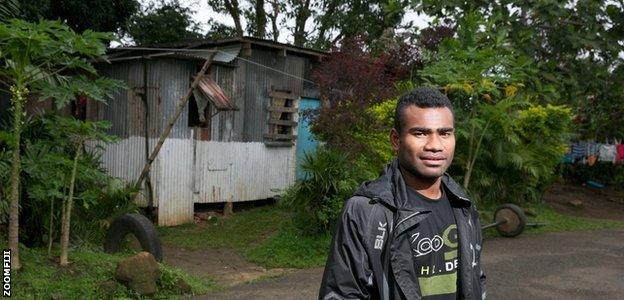
Fiji's Jerry Tuwai outside the home he shares with his parents and four siblings
I grew up watching Sevens and wanting to play for Fiji. It's like that for everyone in the country. But I didn't play rugby at high school - it was one of the few not to have a rugby team. I played volleyball instead and just a bit of rugby at home.
I was 19 before I thought I could be good enough to play for Fiji. I was given my debut last year by our English coach, Ben Ryan. He is good for us - he talks straight, telling us what we can do to improve.
Fijian coaches aren't always up front with you; I was once dropped from the squad at the last minute and I had to read in the paper that it was because the coach thought I was too small.
My dad always wanted me to play rugby. When I flew to my first World Series tournament, in Australia, I took a bus to the airport but my dad found the money - I don't know how - to get there and see me off. He had to sleep on the floor that night.
Everyone in Fiji thinks we will win the gold medal in Rio. Rugby is our national sport and there's lots of pressure but I don't mind, it's normal for us.
Lots of times with my team-mates we sit and talk about winning Fiji's first medal. It's true that lots of players leave Fiji to sign good contracts with clubs overseas but some of the boys here now have turned down offers. They are thinking about the Olympics, not contracts.
For me, I think winning the Olympics is the biggest thing possible to achieve. When I first played for Fiji, people in the settlement didn't believe it could be possible. A gold medal would be like a dream come true.
'Lady Laura - that sounds cool, doesn't it?'
Laura Trott, 23, won two track cycling Olympic titles in London, and a third gold medal in Rio would make her the most successful female British Olympian of all time. She is engaged to fellow double London 2012 cycling champion Jason Kenny.
I thought that I needed two more golds to get the record. I actually googled it the other day because I didn't realise what the best British female had got.
So I need one, well that's not too many is it?! I might be able to achieve that.
It wasn't that long ago that I was looking into it because Jason (Kenny) was asking me about it. If he wins all three of his events he equals Sir Chris Hoy's six gold medals.
Jason always says that I can't do the women-only list, that I should just be part of the overall list. But I said to him: "No Jase, one step at a time, we'll go for the women's list first."
These are the conversations we have in the house - I always say to Jason that he's got one more Olympic gold than me, but I can certainly catch him.
I could keep going until the 2024 Olympics. That's nine years - it doesn't sound too long to keep cycling for, does it? I've been cycling since I was eight and I'm now 23 and those years have gone quick enough.
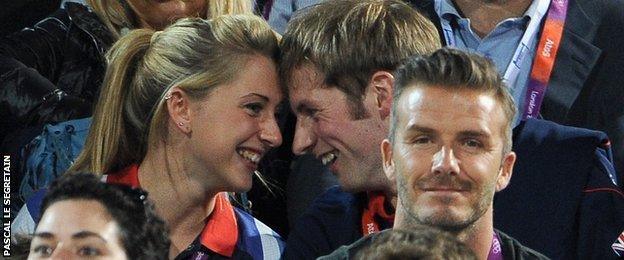
The relationship between British cyclists Laura Trott and Jason Kenny became public at London 2012 when they were pictured together in the crowd behind David Beckham
Before I think about long-term plans like that I have also got a wedding to think about. All we know about the wedding is that it is going to be after the Rio Olympics - we haven't thought about anything more yet.
We don't want the Olympics to be compromised because that is our life, and I don't want the wedding to be half-heartedly done because you only get to do it once.
I think we are on track for Rio. Don't get me wrong, it was horrible to lose in the team pursuit for the first time in four years at the World Championships earlier this year. But it might have been a good thing - some of those girls in the team had never lost a race.
I am hoping we can turn it on its head and use it as a positive rather than the heartbreak we felt at the time.
Trott blasts to stunning omnium gold
When it was one year to go to London, if I was being interviewed I would be wondering "what am I going to say, why am I sat here?"
I have grown as a cyclist but also in the outside world too - people actually know who I am now, whereas before I would never get people come up to me and ask for my autograph.
I still find it really hard to believe that London 2012 actually happened to me. If I get another gold medal then maybe I'd be a Dame. That'd be nice, wouldn't it?
But, really, Jason just needs to become a Sir. You get Lady if your partner becomes a Sir. Then I would be Lady Laura - that sounds cool, doesn't it?
A double life in the fast lane
Nasser Al-Attiyah from Qatar is a multiple rally car champion and a five-time Olympian in shooting. The 45-year-old earned a bronze medal in the skeet clay pigeon shooting at London 2012 and won the famous Dakar Rally for a second time earlier this year.
I took up motorsport first but shooting is my passion and I treasure my Olympic medal the most.
Okay, I have won the Dakar Rally twice and it's a big, important race - for me, it's like the Olympics of rallying. But when I won the bronze medal in London, external it was something I had wanted for 20 years and the feeling was not like anything I had experienced.
You are representing your country, everyone is supporting you. Driving is more for me and my team. If the Olympic Games was taking place at the same time as Dakar or another race then I would choose the Olympics.
I nearly didn't make it to London 2012. I was defending my first Dakar Rally title in Chile when suddenly after 10 days I received a phone call from the shooting federation to say "Nasser, sorry, but the Olympic Committee cannot give you a wildcard to go to London".
They told me the Asian Shooting Championships were in Qatar in a few days and if I wanted to compete and try to qualify for the Olympics, they needed to register me straight away.
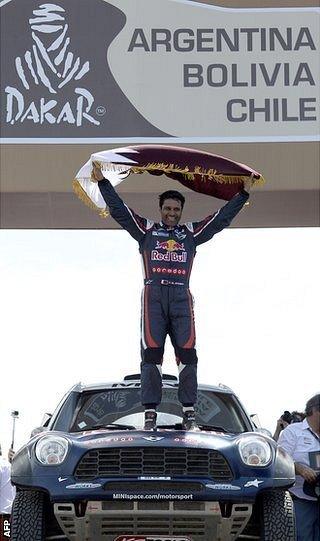
Nasser Al-Attiyah celebrates after winning his second Dakar Rally title this year
So I retired from the Dakar Rally immediately, took a taxi 600km to Santiago's airport and flew to London and then Doha.
It's about 17,000 km and I was really tired. I slept for 30-to-40 minutes between each stage of the shooting competition because I hadn't had time to adjust to the time zone.
But I fought for my Olympic place, equalled the world record and won the Asian Championships gold medal., external For about 20 days afterwards I didn't have the energy to leave the house!
I only started shooting to help me with my driving. Rallying and shooting complement each other - they both require you to be focused and see everything around you. I sometimes have to drive for up to 15 hours a day and a loss of concentration means mistakes can happen.
My father started taking me hunting with a gun when I was 14 but I took up clay pigeon shooting aged 23 or 24. At first it was just for fun, but then the national coach saw me and told me I could shoot for my country and be in the Olympic Games. I took it seriously then.
I take my gun with me everywhere I travel, and when I've finished a race I try to find a shooting range so that I can train.
If there isn't one, there is training I can do without ammunition; just holding your gun, getting the feeling for the movement you need.
I will defend my Dakar title, external in January and after the race I will prepare myself for Rio. I still need to qualify - it is not easy - but I trust myself to do so.
My dream is to be the first person from my country to win a gold medal and I want to continue to a seventh Olympic Games in 2020 and set a record for Dakar Rally titles.
The Copacabana kid
The term 'home Olympics' could not ring more true for beach volleyball player Fernanda Alves, who grew up by Rio's Copacabana beach. The 30-year-old hopes to be competing there at next summer's Games, having won a silver medal alongside partner Taiana Lima at the World Championships in July.
When I was a child I lived just a few minutes walk away from Copacabana in Leme. I grew up there.
I started playing volleyball when I was nine, playing with friends on the courts on Copacabana beach.
It would be incredible if I could play the Olympics on Copacabana. It is a special place for me - a place with great memories.
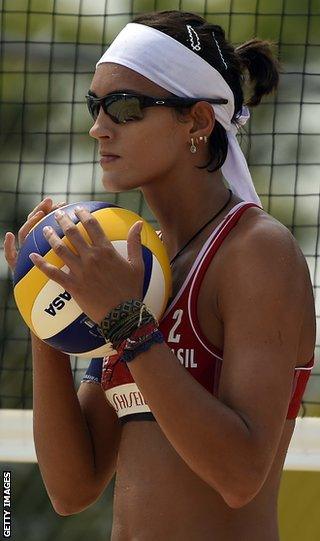
Fernanda Alves won a silver medal at the recent World Championships
Volleyball is the second favourite sport of Brazilians today after football, which is a religion. I started playing beach volleyball in 2012, following a Brazilian Confederation project that converted indoor players into beach players.
Previously I had been playing indoor volleyball for several clubs in Brazil, but also in South Korea and Italy.
We won't be able to celebrate on Wednesday when it is one year to go because at the minute we are concentrating solely on gaining selection for the Olympics.
The race for selection is getting a lot of interest from the press. We had three female teams on the podium at the World Championships but only two can go to the Games.
I have been playing with my partner Taiana Lima since 2014 and we are doing everything we can to get one of the spots for Rio. We have a big desire to improve. Always. And when I say always, it is actually every workout, every move.
We have a very good relationship off the court too, we try to help each other.
Rio is very busy at the moment with all the construction that is going on throughout the city and we definitely feel the changes. There is a mixture of feelings, which I imagine was the same in London. There is a little bit of concern and anxiety that everything will be a success.
Beach volleyball gets a lot of coverage in the press - the TV stations in Brazil show the national tour as well as the international events and I have certainly felt the difference since the results at the World Championships.
I played a national event on Copacabana beach in 2012 and I thought a lot of my childhood - to be able to play there again in one year would be incredible.
Interviews by Tom Reynolds, Noel Sliney and Katie Wright.